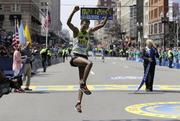
The 2016 Boston Marathon was a coronation for Ethiopia, which collected its first-ever sweep of the men’s and women’s titles.
That doesn’t mean the winners of the world’s most prestigious marathon will get a spot on the Ethiopian Olympic team.
Lemi Berhanu Hayle won the 120th edition of the Boston Marathon on Monday, and fellow Ethiopian Atsede Baysa took the women’s crown. But some of their countrymen are running in the London Marathon next week, and have a chance for faster times than the wind-slowed marks posted in Boston.
Unlike the United States, which held trials to select its Olympic team, the national federations in Ethiopia and other countries pick their teams.
“This is a major marathon,” Baysa said through an interpreter. “We don’t know what they are thinking, but we are confident they will select me.”
Hayle finished in 2 hours, 12 minutes, 45 seconds to beat defending champion Lelisa Desisa by 47 seconds. Yemane Tsegay was an additional 30 seconds back to round out an all-Ethiopian top three.
Baysa finished 44 seconds ahead of fellow Ethiopian Tirfi Tsegaye. Kenyan Joyce Chepkirui’s third-place finish was the only thing that denied Ethiopia a sweep in both races. Kenya, which had dominated the Boston Marathon since the professional era began in 1986, had its worst showing since 1990.
“In sports, sometimes that happens. But not always,” Desisa said. “It is the performance on the day.”
And the performances in Boston might not seem all that impressive on paper. Hayle’s time doesn’t crack the top 150 marathon times in the world this year; Baysa’s 2:29:19 doesn’t rank in the top 50 for the women.
But Boston’s historic up-and-down course and lack of pace-setters leads to the kind of tactical racing that runners are likely to see in Rio de Janeiro. This year’s Boston field included three of the top Ethiopian women ever.
“Boston is different from any other races,” said Desisa, who also won the 2013 race a few hours before a pair of bombs exploded at the finish line.
Here are some other items of note from the 120th Boston Marathon:
FOR THE WIN
Hayle pulled away from Desisa as they crossed over the Massachusetts Turnpike heading into Kenmore Square.
While the men’s finish didn’t have the drama of the women’s finish, Hayle’s flair at the end made up for it. He tapped his chest as he ran down Boylston Street, held his arms out to bask in the cheers of the crowd and then, after crossing the finish line, did a celebratory skip-jump.
“In that time, I didn’t know what I was doing,” he said through an interpreter.
BAYSA’S COMEBACK
Whatever happens with Baysa’s Olympic prospects, her place in Boston Marathon history is already secure.
The 29-year-old fell 37 seconds behind at the 35 Kilometer checkpoint but came back to catch and pass the leaders. And she did it despite a pain in her left hamstring that hit her about 7.5 miles in that allowed the pack to pull away.
“I know my pace,” she said. “When I pace, I know I can beat them. So I moved, caught them and pushed the pace at the end.”
LIKE FATHER, LIKE DAUGHTER
When Neely Spence Gracey says she was born to marathon, she isn’t kidding.
The 26-year-old Coloradan was the top American woman on Monday, finishing ninth in 2:35 in her marathon debut. Her father, Steve Spence, was a world champion bronze medalist who was the No. 2 American in Boston in 1989.
The next year was even bigger: Neely was born while he was running the race.
Gracey said her father gave her tips about how to approach the course. It may have helped – she was near the front through the first seven miles before falling behind the leaders.
“The energy was spectacular,” said Gracey, who ran in the lead alongside Sarah Crouch, of North Carolina, who finished 11th. “We were commenting back and forth saying: ‘Wow! We are leading the Boston Marathon. We need to take this in and relish the moment.'”
WHEEL-TO-WHEELCHAIR
The finish of the men’s wheelchair race was the best of the day, with the top three men all coming to the line within a second of each other.
Switzerland’s Marcel Hug crossed about two lengths in front to win for the second straight year. South Africa’s Ernst Van Dyk was second, outpushing Kurt Fearnley of Australia to win in a photo finish by about the width of a wheel.
“It was a crazy finish. Very, very close but with a good end for me,” said Hug, whose time was nearly 5 minutes faster than his 2015 win. “I’m very happy to defend my title here in Boston.
[SOURCE:- AP]



